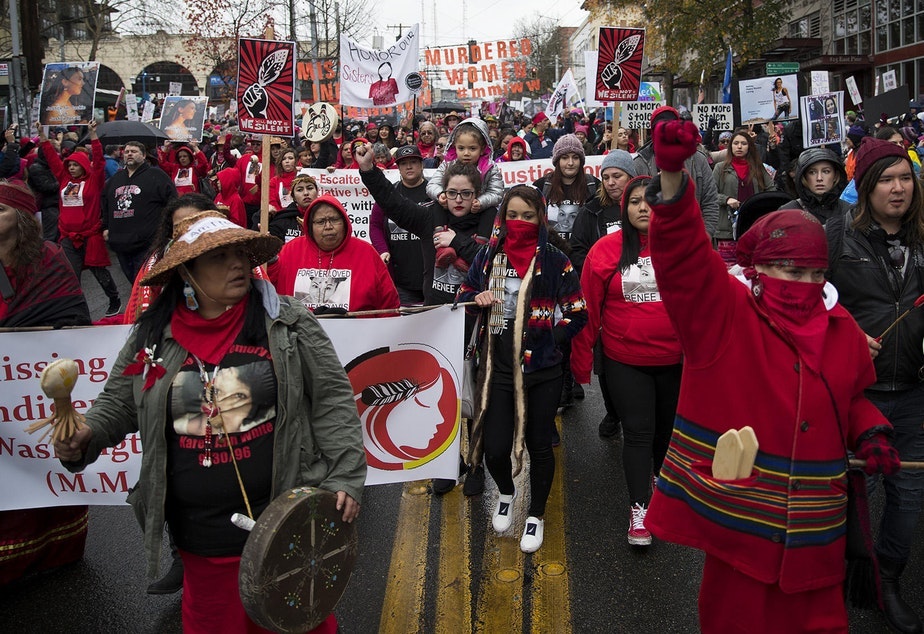'We have to do more': Community leaders respond to state report on missing indigenous women

Fifty-six Native American women are listed as missing in Washington, according to a new State Patrol report.
But representatives of the Native American community told a Seattle City Council hearing on Wednesday that the numbers are an undercount, the result of persistent barriers to gathering data.
Members of the Native American community are calling on government to make a more accurate count – and then to take concrete action on the findings.
“What we're hoping to see is something that is actually actionable, that has resources behind it,” said Abigail Echo-Hawk, with the Seattle Indian Health Board.
“And what we want to see is not only prevention but we want to see intervention."
State Patrol Captain Monica Alexander wrote the report for the Legislature. It lays out some of the problems with arriving at an accurate number.
Sponsored
Lack of coordination and data-sharing among law enforcement agencies. For instance, tribal agencies may not have access to key databases.
"We found that we're maybe not communicating as well as we could,” Alexander said in an interview. “We found actually on the state patrol's website that we don't have everyone that's filed as missing on our website. And we need to figure out why are we not getting all the reports."
Cultural misunderstanding and distrust of law enforcement among concerns expressed by the Native American community during meetings.
"One of the things that we heard quite a bit in our meetings is that they just feel like law enforcement doesn't care about the Native American community,” Alexander said. “That kind of pains my heart because I'm part of law enforcement and I don't want to believe that we don't care about any portion of our community. But if that's the perception we've got to work on that
Integrity of data collection.
At one meeting, community members said law enforcement agencies sometimes won’t take a report if the woman has a reputation of drug or alcohol abuse, a criminal record, or mental health issues. Families also reported being told to wait 24 or 48 hours to report someone missing. Community members also said Native women who are reported missing are sometimes misclassified by race.
Alexander noted in the interview that the State Patrol maintains records on these cases but investigations are generally done by local agencies.
While this report is just a first step in the state’s attempt to better address the long-standing issue of the disappearance and murder of indigenous women, Echo-Hawk said she had greater expectations for it.
“Basically, the report tells us everything we already knew,” Echo-Hawk told the City Council hearing.
“We have to do more … if we allow this to be invisible again, we are all complicit in the violence against indigenous women.”
Echo-Hawk told the council hearing that data should be decolonized – doing things like making sure that information is gathered in a culturally competent way and that violence against indigenous women isn’t hidden because people are misclassified as white. She presented data from a study she co-authored for the Urban Indian Health Institute (UIHI).
This report looked at the cases of both missing and murdered indigenous women. The State Patrol report was only tasked with looking at missing person cases.
Released late last year, the UIHI report found that Seattle had the greatest number of missing and murdered indigenous women of all cities studied. And Washington state had the second-highest number of cases of the states where data was made available.
Sponsored
The UIHI report stresses that the data presented are not the full picture.
“If we rely solely on law enforcement or the media for awareness or understanding of the issue, we will have a deeply inaccurate picture of the realities, minimizing the extent to which our urban American Indian and Alaska Native sisters experience violence,” the UIHI report says.
A state bill signed by Governor Jay Inslee earlier this year mandates that the State Patrol hire two Native American liaisons.
City Councilmember Debora Juarez said that’s a start, but more is needed. She says she'll work with the Native American community and her fellow council members to draft legislation aimed at addressing violence against indigenous women and girls.
“We’ve already done a proclamation. We know what the problem is,” Juarez said.





